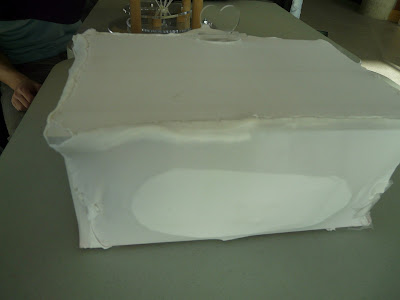301074912
My major contributions to this project were in the areas of ideation, representation, construction of the final product, and aesthetic design. I had a large part in coming up with the concept of a living box and the poetry behind it's shape and function, as well as it's overall shape and colours, etc. I did many of the sketches presented on the website. While Obi did the vast majority of the work in developing the core mechanisms, such as the breathing and heartbeat gears and systems, I helped to design the different configurations of them, as did we all. I also did the writing for phase 2. In designing the final configuration of the project that we built to completion, I designed the box shape and colour, the outer membrane, the spine piece, the lighting, the overall look, and helped with the position of the mechanisms within the box. In the construction of the first iteration of the final piece (shown on monday in lab before the updates got us to build it again), I did around a third of the work (working alongside Maryam and Obi). In the construction of the final piece, I did a large portion(working alongside Maryam for essentially the whole time).
Mariam Khan
301063905
For this project my role was to work alongside my teammates in creating the final concept and form for the Solidworks models in the beginning phases. Throughout the later stages, it was to gather materials, get them cut, as well as assemble them with the help of another teammate. I also contributed in ideating some of the product forms within our platform. As we developed the physical form, we realized that the Solidworks model was a good starting point in terms of how many gears we would need and how they would connect to create the desired movement. However, there were many trials and errors that we came across during the construction of the prototypes and final model. We chose to use a cardboard for our prototype, which was tedious to cut and caused unwanted friction between gears. The prototype was helpful though, in determining what the shape of our levers needed to be and how we would keep them from moving in all directions. Afterwards, we cut them out of acrylic, which was specifically chosen in order to allow light to shine through the mechanical parts of our mechanism. This was a rewarding and challenging material to work with, as it caused very little friction and allowed for smooth movements between our parts. The bond between our parts was often times not strong enough to hold the heavy parts together. We solved this problem by securing the unstable pieces with our own version of “nuts and bolts” that we created from acrylic. Our final outcome for the presentation was a fully functioning kinetic sculpture that mimicked the movements of a heartbeat and of the breathing in and out of lungs. I hope to further improve this sculpture by polishing the outer “skin” of our box, making it cleaner and easier to view the natural movements of the technology. I will also be creating a flap for the skin that will allow for viewing of the inner mechanics, showing our concept of creating taking the natural and confining them with technological boxes.
Obi Vattanawong
301105589
For the final project, my responsibilities were mostly on creating dimensions, preparing files for laser cut and planning for assembly. Some tasks were difficult as I later learned that working on different medium would have different constraints. When putting pieces of the sculpture together, the challenge was that they would not work the way I expected as other forces come into play in physical environment. My teammates who are responsible for the assembly of the project took care of the problem well.
Obi Vattanawong
301105589
For the final project, my responsibilities were mostly on creating dimensions, preparing files for laser cut and planning for assembly. Some tasks were difficult as I later learned that working on different medium would have different constraints. When putting pieces of the sculpture together, the challenge was that they would not work the way I expected as other forces come into play in physical environment. My teammates who are responsible for the assembly of the project took care of the problem well.
















